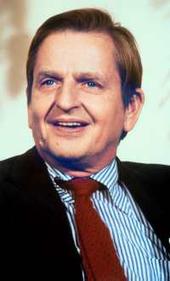Olof Palme was the leader of the Social Democratic Party from 1969 to 1986 and was the Prime Minister of Sweden with a Privy Council Government from 1969 to 1976 and a cabinet government from 1982 until his assassination in 1986. Palme's murder was the first of its kind in modern Swedish history and had an impact across Scandinavia similar to the assassination of John F. Kennedy in the United States.
Palme was born in Östermalm, Stockholm, Sweden. He came from an upper-class background. In time, his political orientation came to be influenced by Social Democratic ideas and ideals. This was mainly the effect of his travels in developing countries as a student leader.
In 1953, Palme was recruited by social democratic prime minister Tage Erlander to work in his secretariat. From 1955 he was a board member of the Swedish Social Democratic Youth League. In 1958 he was elected as an MP.
Olof Palme held several cabinet posts from 1963 and onwards. In 1967 he became Minister of Education, and the following year he was the target of strong criticism from left-wing students protesting against the government's plans for university reform. When party leader Tage Erlander stepped down in 1969, Palme was unanimously elected as the new leader by the Social Democratic party congress and succeeded Erlander as Prime Minister.
Palme's subsequent 125-month tenure as Prime Minister, and his untimely death, made him the most internationally-known Swedish politician of the 20th century.
Olof Palme became the leader of a new generation of Swedish Social Democrats perceived to have stood further to the left of their predecessors. He has sometimes been described as a "revolutionary reformist".
Palme was a controversial political figure on the international scene: his outspoken criticism of the United States for the Vietnam War; his vocal opposition to the Soviets crushing the Prague Spring; campaigning against nuclear weapons proliferation; criticism of the Franco Regime in Spain; opposition to apartheid and support for economic sanctions against South Africa; his support—both political and financial—for the African National Congress (ANC) and the Palestine Liberation Organization (PLO); meeting with Fidel Castro of Cuba, all ensured that Palme had much opposition abroad, as well as friends in many countries. Palme was also a friend of Robert Mugabe, who later became the President of Zimbabwe.
Domestically, too, his political views engendered a great deal of hostility among the Swedish right, especially the Social Democrat drive to expand the Labour Union influence over business. At the time of his death, Palme had been accused of being pro-Soviet and not safeguarding Sweden's interests. Arrangements had therefore been made for him to go to Moscow to discuss a number of contentious issues, including alleged Soviet submarine incursions into Swedish waters.
Expressing support for the PLO and the national liberation movements in Latin America, Palme was wary of the struggles for independence inside the USSR, in Estonia, Latvia and Lithuania. While Swedish right-wing opposition supported Baltic national liberation movements, Palme accused the members of the Moderate Party of "returning to that crusading spirit aiming to 'liberate' Eastern Europe that prevailed in conservative groups in the West during the Cold War" and also accused the Moderates of creating a "danger to the safety of the Swedish security policy". Despite such statements by Palme and completely contrary to official policy, Sweden had in fact secretly maintained far-reaching military co-operation with the West over a long period, and was even under the protection of a U.S. military security guarantee.
Palme was said to have had a profound impact on people's emotions; he was very popular among many on the left, but equally hated by some of his enemies on the right. This was due in part to his international activities, especially those directed against the United States, and in part to his aggressive and outspoken debating style.
Assignments and such
* Chairman for The Swedish National Union of Students 1952-1953.
* Member of the Swedish Social Democratic Party 1952-1986.
* Secretary at the Prime Minister's Office 1953-1961.
* Member of the Swedish Parliament 1958-1986.
* Head of Division at the Prime Minister's Office 1961-1963.
* Minister without Portfolio 1963-1965.
* Minister for Communications 1965-1967.
* Minister for Education 1967-1969.
* Leader of the Swedish Social Democratic Party 1969-1986.
* Prime Minister 1969-1976 and 1982-1986.
* UN's mediator during the Iran-Iraq War 1980-1982.
* Chairman of the Independent Commission on Disarmament and Security Issues ("The Palme Commission") 1980-1986.
